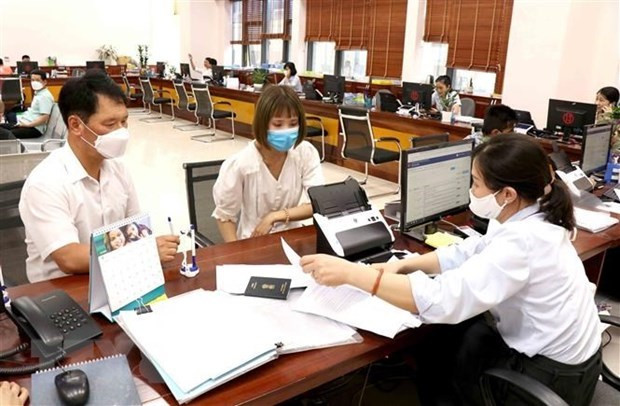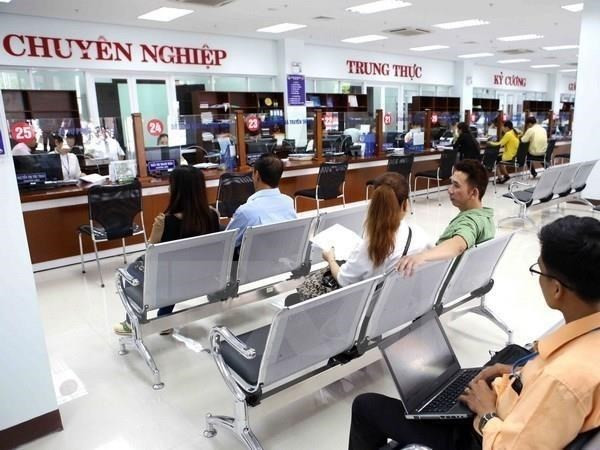The Politburo concluded that over the past time, public service units have been rearranged, reorganized, streamlined, and staffed, increased autonomy, publicity, transparency, and promoted their leading role.

The Politburo issued Conclusion No. 62-KL/TW dated October 2, 2023 on implementing Resolution No. 19-NQ/TW dated October 25, 2017 of the 12th Party Central Committee on continuing to innovate the organization and management system, improving the quality and efficiency of public service units (Resolution 19).
Increase autonomy, openness and transparency
The Politburo concluded that over the past time, Party committees, Party organizations, and authorities at all levels have focused on leading, directing, and organizing the implementation of Resolution 19, achieving a number of positive results, contributing to ensuring social security and realizing the goals of social progress and equity.
Public service units have been rearranged, reorganized, streamlined, and staffed, increased autonomy, openness, and transparency; promoted their leading role, improved quality, and basically met the essential needs of the people, especially in remote areas, ethnic minority areas, mountainous areas, border areas, and islands. The results of implementing the socialization policy have contributed to increasing resources, reducing pressure on public service units, and gradually forming a healthy public service market.
In addition, there are some limitations and weaknesses, such as the failure to promptly, fully and synchronously institutionalize the Party's guidelines, the State's policies and laws, especially regarding the organization of the apparatus, regimes and policies for public service units after the reorganization; financial autonomy mechanism; economic-technical norms as the basis for pricing public service services; responsibility for publicity, transparency and accountability.
In some places, the reorganization of the apparatus and the streamlining of the payroll are still mechanical and unbalanced, not linked to the restructuring and improvement of the quality of the staff. The operational efficiency of many public service units after the reorganization has not met the requirements. The socialization policy has not strongly attracted economic sectors to participate in the development of public service. State management of the activities of public service units has not received due attention, and some individuals and units have violated the law.
The above limitations and weaknesses are mainly due to the lack of awareness and responsibility of a part of Party committees, Party organizations, authorities, and leaders, and their lack of determination in leading, directing, and organizing the implementation of Resolution 19. Advisory, guidance, inspection, and audit work is not regular; some places are still passive, the idea of subsidies and dependence on the State is still widespread; the supervisory role of the Vietnam Fatherland Front, socio-political organizations, and the people has not been promoted.
Fundamental, comprehensive and synchronous innovation of the public service unit system
To continue to strictly implement the guiding viewpoints, goals, tasks, solutions and fundamental, comprehensive and synchronous innovation of the system of public service units according to Resolution 19, the Politburo requires Party committees, Party organizations and authorities to focus on leading and directing the good implementation of a number of key tasks and solutions; accordingly, promote information and propaganda work, raise awareness and responsibility of Party committees, Party organizations, authorities, functional agencies, public service units and people, especially leaders and leaders and managers, to create unity, consensus and high determination to continue to effectively implement Resolution 19; promptly detect and replicate typical public service unit models with dynamic, creative and effective ways of working; reward and commend organizations and individuals who perform well; review organizations and individuals who do not implement, do not properly or fully implement the Party's guidelines and policies and the State's laws.
Party committees, party organizations, and authorities at all levels should pay attention to reviewing, amending, supplementing, and perfecting laws, ensuring a complete, synchronous, and feasible legal framework that meets the requirements for implementing Resolution 19 in conjunction with relevant Party policies, especially regarding organizational structure, criteria and conditions for arrangement, human resources and team structure, regimes, and policies, focusing on policies to attract talents and people with good professional expertise; autonomy and self-responsibility mechanisms, salary policies suitable to the characteristics of the industry and career fields; economic and technical norms to price each type of public service, complete the roadmap for calculating public service prices, clearly define welfare policies and social security policies in public service prices; inspection, control, supervision, and governance mechanisms in the direction of enhancing democracy, publicity, transparency, and accountability; activities of inspection, pricing, and independent assessment of the quality of public service; Socialization policies are suitable to the country's development practices. Research, develop and promulgate legal documents to regulate public and non-public service units in general, facilitating the implementation of Resolution 19.
The Politburo requested to improve the effectiveness and efficiency of State management, perfect the planning of the network of public and non-public service units associated with socio-economic development planning and plans, expand coverage, improve quality, contribute to ensuring social security, progress and equity, and increasingly better meet the needs of the people.

In addition, continue to increase the State budget and innovate the allocation towards focusing on basic and essential public services, performing political tasks, serving State management; for areas with difficult and especially difficult socio-economic conditions, policy beneficiaries, people facing difficulties in life, while promoting the State mechanism of ordering, assigning tasks, and bidding for the provision of public services.
In addition, decentralization and delegation of power should be specific and clear between the central and local levels, between specialized state management agencies and state management agencies on investment and finance; management capacity, sense of responsibility, and exemplary behavior of heads, leaders, and managers of public service units should be enhanced, and authority and responsibility should be linked, and benefits and work efficiency should be linked.
Based on the identification of public career services in which the State plays a leading role; the conditions, capabilities and autonomy levels of units to develop a plan and roadmap to continue promoting the arrangement of public career units from now until 2030 according to the goals of Resolution 19.
The units after the rearrangement must have a suitable organizational structure, a staff structure associated with job positions; advanced management methods, increased application of information technology, science and technology; operational efficiency is evaluated based on products and work results.
The units ensure the continuous provision of public services, especially basic and essential public services for the people, especially in rural, remote, isolated, ethnic minority, mountainous, border and island areas; facilitate people's access to public services. At the same time, conduct preliminary and final reviews of the implementation of the transformation of public service units into autonomous models; pilot policies on socialization of preschool and general education facilities; conduct examinations and hire directors of public service units.
The conclusion stated: Improve the effectiveness of implementing the socialization policy, especially preferential policies on land, taxes, fees, credit, and attracting investment in public service. Socialization policies must be close to reality, feasible, and equal to rapidly develop non-public service units, especially in the fields of education and training, vocational education, health care, science and technology in places with sufficient conditions, large cities and urban areas with rapidly growing populations; complete the conversion of qualified economic and other service units into joint stock companies (except hospitals and schools).
Promote and improve the effectiveness of the supervisory activities of the National Assembly, People's Councils, the Vietnam Fatherland Front, socio-political organizations at all levels and the people in implementing Resolution 19, especially the conditions of access and quality of service provision of public and non-public service units.

The Politburo requests that Party committees, Party delegations, Party executive committees, Party committees, provincial Party committees, and centrally-run city Party committees seriously grasp, lead, and direct the implementation of this Conclusion; develop plans and assign tasks to relevant agencies, organizations, and individuals; integrate the implementation into the socio-economic development plans of ministries, branches, and localities; regularly organize inspections, supervisions, and monitoring; and periodically report on implementation results.
The National Assembly Party Delegation and the Government Party Committee shall lead and direct the review, amendment, supplementation and completion of relevant laws. The Government Party Committee shall lead and direct the implementation of this Conclusion; review and summarize the pilot model; amend, supplement and promulgate legal documents within its authority.
The Central Economic Commission shall preside over and coordinate with relevant agencies to regularly monitor, guide, inspect, urge, periodically review, summarize, and report to the Politburo the results of the implementation of Resolution 19 and this Conclusion.
According to VNA